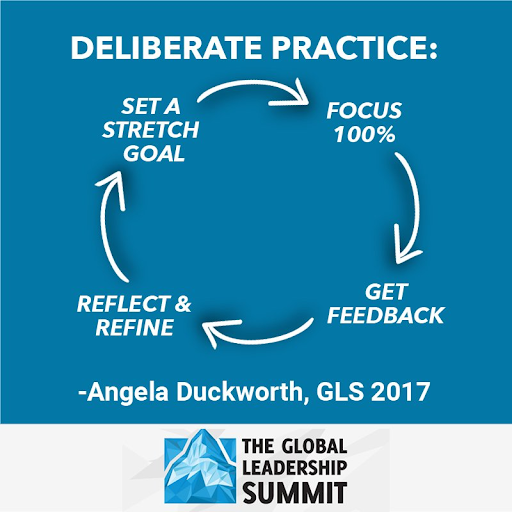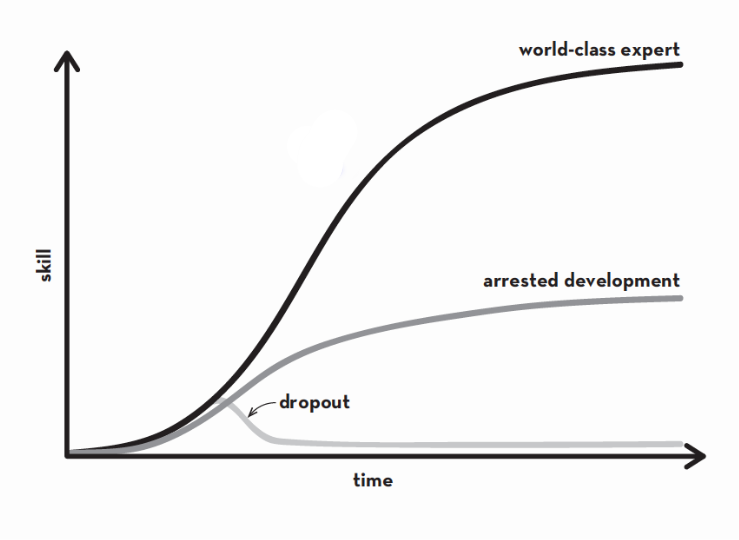‘Kaizen’ is a concept heard normally when discussing quality in manufacturing. It’s a Japanese word that literally means “continuous improvement.” It’s a persistent desire to do better, to excel beyond the current level of expertise. It’s very much a positive state of mind in that you only look backward on successes or mistakes to celebrate, learn, move forward, and grow. There is no place to either rest on our past successes or dwell on past mistakes.
Maybe the most famous study that included this concept of continuous improvement was done by Anders Ericsson. Ericsson is a cognitive psychologist who spent his career studying how experts acquire world-class skills. He studied Olympic athletes, chess grandmasters, renowned concert pianists, prima ballerinas, PGA golfers, and expert radiologists—he is the expert on experts.

The type of practice that Ericsson found most world-class experts to engage in is what he calls deliberate practice, to which there are four parts:
1. Stretch goal. The focus is on a very specific aspect of performance that is trying to be improved. This is generally one of the weaker aspects of one’s performance.
2. 100% focus, or practice with full effort and concentration. It’s not practicing while listening to a podcast, or posting on social media and having a text conversation with a friend. It’s total focus and effort.
3. Feedback. Feedback is ideally immediate, data-driven, and easily measurable. “Did I make the shot or not.” “What was my time?” “Did I hit the receiver in stride?”
4. Reflect and refine. Feedback is typically negative (e.g., “Here is what you didn’t do that you set out to do”). What world-class experts do that most of us don’t is truly open themselves up and listen to feedback. They reflect, make adjustments, and start the cycle over again.

It’s this process of deliberate practice done over and over and over that allows us to continuously improve, grow, and realize our true potential.
The Seahawks just whooped the Patriots on a recent Sunday night football, and in his post-game press conference, Russell Wilson described how deliberate practice helps his team make plays like the exceptional ones made to win the game. He said, “People talk about 10,000 hours to be great; I feel like I’ve spent 30,000 hours making those types of plays. You spend so much time in the offseason, with just the obsession of doing it over and over and over and over again, working at it, perfecting it. It’s not perfect, let’s do it again, let’s rep it again, let’s get it right. Those guys (his teammates) have completely bought into the process of it all, completely bought into the work ethic of it all.” He goes on to say, “I love winning. I love the process of winning. I love the process of the week (of practice). I love that more than the end result even.”
If we can embrace and fall in love with the process of deliberate practice, the sky’s the limit for what we are trying to accomplish.
So, as far as our team goes, one of the main ways continuous improvement is achieved is with the help of coaching and accountability from our success manager. Agents meet with our success manager once a week and receive feedback on the goals they created themselves and are then coached on their next steps to move forward. Along with this accountability and coaching, we provide two training sessions a week that agents are able to take advantage of. Couple this with the tools and leads we provide and the growth potential for our agents’ skills and business are constrained only by their desire to achieve them.
If you have a passion to be a great Realtor and find yourself plateauing, or just not sure what to do next to perpetuate Kaizen and stay on the path of growth in your career, give me a call to schedule a private one on one meeting. I would love to help you!





